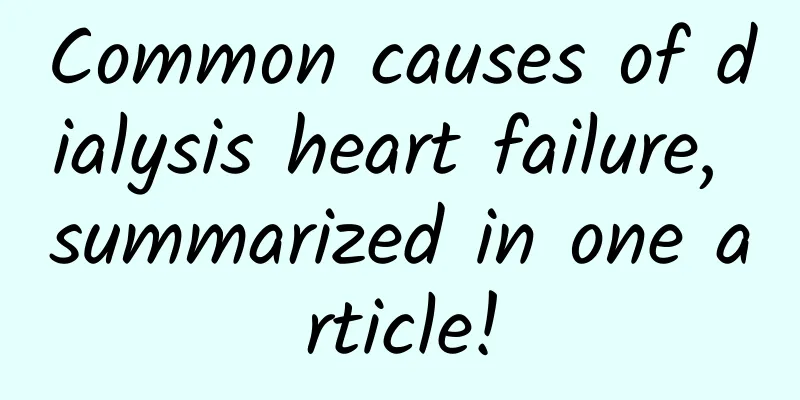Common causes of dialysis heart failure, summarized in one article!

|
1. Excessive capacity load The renal drainage function of dialysis patients is impaired. If water intake is not strictly controlled between dialysis sessions, drinking a large amount of water in a short period of time will cause excessive fluid retention in the body. At the same time, insufficient ultrafiltration during dialysis cannot effectively remove excess water, leading to a continuous increase in blood volume, excessive heart load, and ultimately heart failure. For example, some patients gain weight beyond the prescribed range between dialysis sessions, which puts great pressure on the heart. 2. Poor control of hypertension Long-term high blood pressure will increase the afterload of the heart, requiring the heart to pump blood more vigorously. If the blood pressure of dialysis patients is at a high level for a long time and is not effectively controlled, the structure and function of the heart will gradually be damaged. For example, if the blood pressure is higher than 160/90 mmHg for a long time, the heart will be under high pressure for a long time, the myocardium will gradually thicken, and eventually lead to decreased heart function and heart failure. 3. Severe anemia Dialysis patients often have varying degrees of anemia, which can lead to insufficient oxygen supply to various tissues and organs of the body. In order to meet the needs of the body, the heart has to speed up the beating frequency and increase the output. If this continues for a long time, the burden on the heart will increase and it is easy to cause heart failure. If the hemoglobin level continues to be lower than 80g/L, the burden on the heart will increase significantly. 4. Electrolyte imbalance During dialysis, if electrolytes are imbalanced, especially potassium and calcium, it will affect the normal electrophysiological activity of the heart. For example, hyperkalemia can lead to heart conduction block, arrhythmia, and in severe cases, heart failure. In addition, hypocalcemia can also affect myocardial contractility and increase the risk of heart failure. |
<<: Long-term use of ticagrelor, these 5 medication details must be known
>>: How can patients on dialysis prevent heart failure? Here are 4 tips to help you!
Recommend
Can I take enzymes during my period?
In fact, there are some things you should not eat...
Causes and treatments of fallopian tube obstruction and red-green color blindness in women
With the continuous progress of the times, more a...
Woman chest pain
Many people feel inexplicable chest pain in their...
Sanitary napkin allergy
The invention of sanitary napkins has solved many...
Why is the leucorrhea in the shape of tofu dregs?
Abnormal vaginal discharge is a common problem am...
Correct method of vaginal cleaning
The correct method of cleaning the vagina is very...
How to identify poisonous mushrooms? Why are beautiful mushrooms poisonous?
Mushrooms are a type of fungus, which can be roug...
Bleeding due to excessive exertion during intercourse
In daily life, many women have experienced vagina...
What to do if your vagina has odor
Whether a woman is beautiful or not cannot be the...
Don’t be fooled by the teachers’ arrogant attitude, they are actually very miserable!
This article was first published by Hey Stone Hea...
The harm of long-term insomnia in women
The harm of long-term insomnia is not limited to ...
Can you get pregnant with irregular menstruation? How to deal with it?
Pregnancy is a major event in women's lives, ...
Is your appearance plummeting? Maybe you have this disease.
Is your appearance plummeting? Maybe you have thi...
Frequent acne on the chin of women
Acne on the face is very distressing for many you...
Postpartum ovarian cysts
Ovarian cysts after childbirth are a relatively c...









